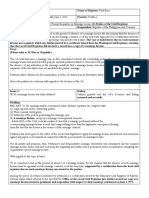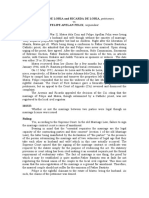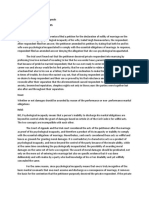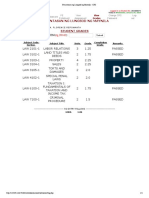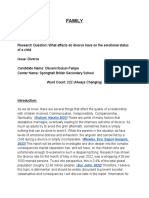100%(2)100% found this document useful (2 votes)
1K viewsYao Kee Vs Sy-Gonzales
Yao Kee Vs Sy-Gonzales
Uploaded by
OlenFuerte1) The petitioners failed to prove the validity of the marriage between Yao Kee and Sy Kiat under Chinese law, as they did not present competent evidence of Chinese law or customs regarding marriage.
2) Philippine courts cannot take judicial notice of foreign laws and they must be alleged and proved. Since the petitioners did not prove Chinese law, it is presumed to be the same as Philippine law.
3) Without proving the validity of the marriage under Chinese law, the Court found that the private respondents should be considered the acknowledged natural children of Sy Kiat, rather than legitimate children from a proven valid marriage.
Copyright:
© All Rights Reserved
Available Formats
Download as DOCX, PDF, TXT or read online from Scribd
Yao Kee Vs Sy-Gonzales
Yao Kee Vs Sy-Gonzales
Uploaded by
OlenFuerte100%(2)100% found this document useful (2 votes)
1K views2 pages1) The petitioners failed to prove the validity of the marriage between Yao Kee and Sy Kiat under Chinese law, as they did not present competent evidence of Chinese law or customs regarding marriage.
2) Philippine courts cannot take judicial notice of foreign laws and they must be alleged and proved. Since the petitioners did not prove Chinese law, it is presumed to be the same as Philippine law.
3) Without proving the validity of the marriage under Chinese law, the Court found that the private respondents should be considered the acknowledged natural children of Sy Kiat, rather than legitimate children from a proven valid marriage.
Original Description:
digest
Original Title
Yao Kee vs Sy-Gonzales
Copyright
© © All Rights Reserved
Available Formats
DOCX, PDF, TXT or read online from Scribd
Share this document
Did you find this document useful?
Is this content inappropriate?
1) The petitioners failed to prove the validity of the marriage between Yao Kee and Sy Kiat under Chinese law, as they did not present competent evidence of Chinese law or customs regarding marriage.
2) Philippine courts cannot take judicial notice of foreign laws and they must be alleged and proved. Since the petitioners did not prove Chinese law, it is presumed to be the same as Philippine law.
3) Without proving the validity of the marriage under Chinese law, the Court found that the private respondents should be considered the acknowledged natural children of Sy Kiat, rather than legitimate children from a proven valid marriage.
Copyright:
© All Rights Reserved
Available Formats
Download as DOCX, PDF, TXT or read online from Scribd
Download as docx, pdf, or txt
100%(2)100% found this document useful (2 votes)
1K views2 pagesYao Kee Vs Sy-Gonzales
Yao Kee Vs Sy-Gonzales
Uploaded by
OlenFuerte1) The petitioners failed to prove the validity of the marriage between Yao Kee and Sy Kiat under Chinese law, as they did not present competent evidence of Chinese law or customs regarding marriage.
2) Philippine courts cannot take judicial notice of foreign laws and they must be alleged and proved. Since the petitioners did not prove Chinese law, it is presumed to be the same as Philippine law.
3) Without proving the validity of the marriage under Chinese law, the Court found that the private respondents should be considered the acknowledged natural children of Sy Kiat, rather than legitimate children from a proven valid marriage.
Copyright:
© All Rights Reserved
Available Formats
Download as DOCX, PDF, TXT or read online from Scribd
Download as docx, pdf, or txt
You are on page 1of 2
Civil Code.
] On this score the Court had occasion to state that "a
local custom as a source of right can not be considered by a court
of justice unless such custom is properly established by
YAO KEE vs SY-GONZALES competent evidence like any other fact”. The same evidence, if
not one of a higher degree, should be required of a foreign
PETITIONERS: YAO KEE, SZE SOOK WAH, SZE LAI CHO, custom.
and SY CHUN YEN
RESPONDENTS: AIDA SY-GONZALES, MANUEL SY, The law on foreign marriages is provided by Article 71 of the Civil
TERESITA SY-BERNABE, RODOLFO SY, and HONORABLE Code which states that:
COURT OF APPEALS Art. 71. All marriages performed outside the
DOCKET NO.: GR No. L-55960 Philippines in accordance with the laws in force in the
DATE: November 24, 1988 country where they were performed and valid there as
PONENTE: Cortes, J. such, shall also be valid in this country, except bigamous,
Polygamous, or incestuous marriages, as determined by
FACTS: Philippine law.
• Sy Kiat, a Chinese national, residing in Caloocan City, died
on January 17, 1977 leaving behind properties here in the Construing this provision of law the Court has held that to
Philippines worth P300,000.00 more or less. establish a valid foreign marriage two things must be proven,
• Thereafter, Aida Sy-Gonzales et al filed a petition for the namely: (1) the existence of the foreign law as a question of fact;
grant of letters of administration alleging that; and (2) the alleged foreign marriage by convincing evidence.
(a) they are the children of the deceased with Asuncion
Gillego; In proving a foreign law the procedure is provided in the Rules of
(b) to their knowledge Sy Mat died intestate; Court. With respect to an unwritten foreign law, Rule 130 section
(c) they do not recognize Sy Kiat's marriage to Yao Kee 45 states that:
nor the filiation of her children to him; and, SEC. 45. Unwritten law.—The oral testimony of witnesses,
(d) they nominate Aida Sy-Gonzales for appointment skilled therein, is admissible as evidence of the unwritten
as administratrix of the intestate estate law of a foreign country, as are also printed and published
books of reports of decisions of the courts of the foreign
• The petition was opposed by Yao Kee et al alleging that; country, if proved to be commonly admitted in such courts.
(a) Yao Kee is the lawful wife of Sy Kiat whom he
married on January 19, 1931 in China;
Proof of a written foreign law, on the other hand, is provided for
(b) the other oppositors are the legitimate children of
under Rule 132 section 25, thus:
the deceased with Yao Kee; and,
SEC. 25. Proof of public or official record.—An official
(c) Sze Sook Wah is the eldest among them and is
record or an entry therein, when admissible for any
competent, willing and desirous to become the
purpose, may be evidenced by an official publication
administratrix of the estate of Sy Kiat
thereof or by a copy attested by the officer having the legal
custody of the record, or by his deputy, and accompanied,
PROBATE COURT: rendered decision in favor of Yao Kee.
if the record is not kept in the Philippines, with a certificate
CA: Modified the decision.
that such officer has the custody. If the office in which the
(1) Declaring petitioners Aida Sy-Gonzales et. al. as
record is kept is in a foreign country, the certificate may be
acknowledged natural children of the deceased with
made by a secretary of embassy or legation, consul
Asuncion Gillego, an unmarried woman with whom he lived
general, consul, vice consul, or consular agent or by any
as husband and wife without benefit of marriage for many
officer in the foreign service of the Philippines stationed in
years:
the foreign country in which the record is kept and
(2) Declaring oppositors Sze Sook Wah et.al. as the
authenticated by the seal of his office.
acknowledged natural children of the deceased Sy Kiat with
Yao Kee, since the legality of the alleged marriage of Sy Mat
The Court has interpreted section 25 to include competent
to Yao Kee in China had not been proven to be valid to the
evidence like the testimony of a witness to prove the existence of
laws of the Chinese People's Republic of China
a written foreign law
(3) Declaring the deed of sale executed by Sy Kiat to be valid
and be excluded from the estate; and In the case at bar petitioners did not present any competent
(4) Affirming the appointment by the lower court of Sze Sook evidence relative to the law and custom of China on
Wah as judicial administratrix of the estate of the deceased.
marriage. The testimonies of Yao and Gan Ching cannot be
considered as proof of China's law or custom on marriage
Both parties moved for recon, questioning paragraphs (3) and (4) not only because they are self-serving evidence, but more
of the dispositive portion of the CA's decision, but subsequently importantly, there is no showing that they are competent to
denied by SC.
testify on the subject matter.
This petition questions paragraphs (1) and (2) of the dispositive For failure to prove the foreign law or custom, and
portion of the decision of CA. SC initially denied the appeal but consequently, the validity of the marriage in accordance with
decided to give due course this petition upon motion for recon.
said law or custom, the marriage between Yao Kee and Sy
Kiat cannot be recognized in this jurisdiction.
YAO KEE et al: Petitioners argue that the marriage of Sy Kiat to
Yao Kee in accordance with Chinese law and custom was
conclusively proven. To buttress this argument they rely on the
ISSUE #2: W/N court may take Judicial Notice of Laws of China
testimonial and documentary evidence of Yao Kee herself, Gan
Ching, a younger brother of Yao Kee, Asuncion Gillego, and HELD: No. Well-established in this jurisdiction is the principle
documents which states that Sy Kiat is married.
that Philippine courts cannot take judicial notice of foreign laws.
They must be alleged and proved as any other fact. In the
ISSUE #1: W/N the marriage of Sy Kiat with Yae Kee was duly
absence of proof of the Chinese law on marriage, it should be
proven to be valid in accordance with Laws of China
presumed that it is the same as ours
HELD: These evidence may very well prove the fact of marriage
ISSUE #3: W/N the status of private respondents shall be an
between Yao Kee and Sy Kiat. However, the same do not suffice
acknowledged natural children or legitimate children.
to establish the validity of said marriage in accordance with
Chinese law or custom. HELD: Petitioners failed to establish the marriage of Yao Kee
with Sy Mat according to the laws of China, they cannot be
Custom is defined as "a rule of conduct formed by repetition of
accorded the status of legitimate children but only that of
acts, uniformly observed (practiced) as a social rule, legally
acknowledged natural children. Petitioners are natural children,
binding and obligatory”. The law requires that "a custom must be
it appearing that at the time of their conception Yao Kee and Sy
proved as a fact, according to the rules of evidence" [Article 12,
Kiat were not disqualified by any impediment to marry one
another [See Art. 269, Civil Code.] And they are acknowledged
children of the deceased because of Sy Kiat's recognition.
Private respondents on the other hand are also the deceased's
acknowledged natural children with Asuncion Gillego, a Filipina
with whom he lived for twenty-five (25) years without the benefit
of marriage.
WHEREFORE, the decision of the Court of Appeals is hereby
AFFIRMED.
You might also like
- Complaint Manalo Case (Labor)Document9 pagesComplaint Manalo Case (Labor)OlenFuerte100% (1)
- Complaint Manalo Case (Labor)Document9 pagesComplaint Manalo Case (Labor)OlenFuerte100% (1)
- D.M. Consunji vs. CA DigestDocument2 pagesD.M. Consunji vs. CA DigestThea Barte86% (7)
- Tenchavez vs. Escano (15 SCRA 355) Case DigestDocument2 pagesTenchavez vs. Escano (15 SCRA 355) Case DigestCamelle Escaro100% (1)
- Tilar DigestDocument2 pagesTilar Digestmaieruchan100% (1)
- Republic of The Philippines v. Marelyn Tanedo ManaloDocument2 pagesRepublic of The Philippines v. Marelyn Tanedo ManaloG S100% (1)
- CIR Vs de La SalleDocument2 pagesCIR Vs de La SalleOlenFuerte100% (7)
- Family Forms in The CaribbeanDocument19 pagesFamily Forms in The Caribbeanknocarchi smithNo ratings yet
- Van Dorn vs. Romillo Jr. DigestDocument1 pageVan Dorn vs. Romillo Jr. DigestMiley Lang100% (5)
- Kho Vs RepublicDocument1 pageKho Vs RepublicJohn Fredrick BucuNo ratings yet
- 1people VS JanssenDocument1 page1people VS JanssenJoann LedesmaNo ratings yet
- Corporation vs. Pinatubo Commercial, G.R. No. 176006, March 26, 2010)Document1 pageCorporation vs. Pinatubo Commercial, G.R. No. 176006, March 26, 2010)Vince Llamazares Lupango100% (1)
- Wiegel Vs Sempio-Diy 143 SCRA 499 PDFDocument1 pageWiegel Vs Sempio-Diy 143 SCRA 499 PDFJERROM ABAINZANo ratings yet
- Corpus v. Sto. TomasDocument2 pagesCorpus v. Sto. TomasChari100% (3)
- Ninal V BayadogDocument2 pagesNinal V BayadogG S100% (2)
- Bellis Vs Bellis Case DigestDocument3 pagesBellis Vs Bellis Case DigestClarisse Tingchuy100% (2)
- Aznar vs. Garcia G.R. No. L-16749 - Case DigestDocument2 pagesAznar vs. Garcia G.R. No. L-16749 - Case DigestGendale Am-is100% (3)
- General Information:: Sta. Ana Hospital Department of Rehabilitation Medicine Physical Therapy SectionDocument13 pagesGeneral Information:: Sta. Ana Hospital Department of Rehabilitation Medicine Physical Therapy SectionOlenFuerteNo ratings yet
- Yao Kee v. Gonzales, GR. No. L-55960, November 24, 1988Document1 pageYao Kee v. Gonzales, GR. No. L-55960, November 24, 1988MonicaCelineCaroNo ratings yet
- Garcia vs. RecioDocument2 pagesGarcia vs. RecioJam Gonzaga100% (1)
- Goitia vs. Campos RuedaDocument2 pagesGoitia vs. Campos RuedaKelsey Olivar Mendoza100% (3)
- G.R. No. 152577 September 21, 2005 REPUBLIC OF THE PHILIPPINES, Petitioners, v. CRASUS L. IYOY, RespondentDocument2 pagesG.R. No. 152577 September 21, 2005 REPUBLIC OF THE PHILIPPINES, Petitioners, v. CRASUS L. IYOY, RespondentG S100% (2)
- 7 Ardiente v. Javier CDDocument1 page7 Ardiente v. Javier CDbobjess14100% (1)
- Antonio Geluz vs. COURT OF APPEALS G.R. No. L-16439 July 20, 1961 FactsDocument8 pagesAntonio Geluz vs. COURT OF APPEALS G.R. No. L-16439 July 20, 1961 FactsNeil Adonis UsaragaNo ratings yet
- Navarro V DomagtoyDocument1 pageNavarro V DomagtoyG S0% (1)
- de Jesus Vs Syquia 58 Phil 863 DigestDocument2 pagesde Jesus Vs Syquia 58 Phil 863 DigestJERROM ABAINZA100% (1)
- Quimiguing Vs Icao 34 SCRA 132 SummaryDocument2 pagesQuimiguing Vs Icao 34 SCRA 132 Summarycertiorari19100% (4)
- Wassmer v. Velez, GR. No. L-20089, December 26, 1964Document1 pageWassmer v. Velez, GR. No. L-20089, December 26, 1964MonicaCelineCaro100% (1)
- Balogbog Vs CADocument2 pagesBalogbog Vs CAParis Valencia100% (2)
- Goitia v. Campos-RuedaDocument2 pagesGoitia v. Campos-RuedaPortia Wynona100% (1)
- San Luis Versus San Luis GR 133743Document4 pagesSan Luis Versus San Luis GR 133743Lu Cas100% (2)
- ARROYO vs. VASQUEZDocument2 pagesARROYO vs. VASQUEZAnonymous NqaBAy100% (3)
- SSS V Teresita Jarque Vda de BailonDocument1 pageSSS V Teresita Jarque Vda de BailonAweGooseTreeNo ratings yet
- de Loria v. Felix, G.R. No. L-9005, June 20, 1958Document2 pagesde Loria v. Felix, G.R. No. L-9005, June 20, 1958noniebellNo ratings yet
- Manila Public School Teachers Association v. GSISDocument2 pagesManila Public School Teachers Association v. GSISAriza HuelgasNo ratings yet
- Guy Vs CA Case DigestDocument2 pagesGuy Vs CA Case Digestkikhay11100% (1)
- Aznar vs. Christensen-Garcia (G.R. NO. L-16749, JANUARY 31, 1963) FactsDocument1 pageAznar vs. Christensen-Garcia (G.R. NO. L-16749, JANUARY 31, 1963) FactsJamiah Obillo HulipasNo ratings yet
- PAHALAWAN, DAMHAR K. (Final)Document10 pagesPAHALAWAN, DAMHAR K. (Final)Damhar K. PahalawanNo ratings yet
- Case Digest 1 Nmsmi Vs Military ShrineDocument2 pagesCase Digest 1 Nmsmi Vs Military ShrineAronJames100% (2)
- Dumlao v. Quality PlasticsDocument1 pageDumlao v. Quality PlasticsLayaNo ratings yet
- CIR Vs Primetown DigestDocument1 pageCIR Vs Primetown DigestChanyeol ParkNo ratings yet
- Martinez Vs Buskirk DigestDocument3 pagesMartinez Vs Buskirk Digesttricia_merc100% (2)
- San Luis V San Luis Case DigestDocument1 pageSan Luis V San Luis Case DigestJerico GodoyNo ratings yet
- Martinez Vs Van BuskirkDocument2 pagesMartinez Vs Van BuskirkMinato NamikazeNo ratings yet
- People vs. LiceraDocument2 pagesPeople vs. Licerajey100% (1)
- Republic Vs DagdagDocument2 pagesRepublic Vs DagdagDanielle0% (1)
- OCAMPO V FLORENCIANO DigestDocument2 pagesOCAMPO V FLORENCIANO DigestA M I R A100% (1)
- Arreza vs. ToyoDocument1 pageArreza vs. ToyoDawn Pocholo SantosNo ratings yet
- Bugayong v. Ginez Persons DigestDocument3 pagesBugayong v. Ginez Persons Digestkathrynmaydeveza100% (3)
- Chu Jan vs. Bernas (G.R. No. L-10010)Document1 pageChu Jan vs. Bernas (G.R. No. L-10010)Evangelyn Egusquiza100% (4)
- Morimoto V MorimotoDocument3 pagesMorimoto V MorimotoSarah Jane Usop100% (1)
- Continental Steel Manufacturing Corporation vs. MontanoDocument1 pageContinental Steel Manufacturing Corporation vs. MontanoEthan Kurby100% (1)
- Ong Vs Ong Case DigestDocument2 pagesOng Vs Ong Case DigestBiyaya Bellz100% (2)
- Case Digest Navarro vs. DomagtoyDocument1 pageCase Digest Navarro vs. DomagtoyDarielle Fajardo100% (3)
- Case Digest Hernandez Vs CADocument2 pagesCase Digest Hernandez Vs CAAnonymous OzIYtbjZ100% (1)
- Repubic V Encelan DigestDocument1 pageRepubic V Encelan DigestLayaNo ratings yet
- Estate of Amos Bellis Case DigestDocument2 pagesEstate of Amos Bellis Case Digesthistab100% (3)
- Buenaventura Vs Court of Appeals (Article 21)Document2 pagesBuenaventura Vs Court of Appeals (Article 21)Juralex100% (2)
- Buenaventura V CA DigestDocument1 pageBuenaventura V CA Digestmybernal18No ratings yet
- Ting Vs Velez - TingDocument2 pagesTing Vs Velez - TingPatricia BautistaNo ratings yet
- De La Camara Goitia v. Campos-RuedaDocument1 pageDe La Camara Goitia v. Campos-RuedaG SNo ratings yet
- I.d.vi. Yao Kee v. Sy Gonzales DigestDocument3 pagesI.d.vi. Yao Kee v. Sy Gonzales DigestVince Michael OngNo ratings yet
- Yao Kee v. Sy-Gonzales 1988Document3 pagesYao Kee v. Sy-Gonzales 1988Andie PlayerNo ratings yet
- Yao Kee Vs Sy Gonzales - Case DigestDocument2 pagesYao Kee Vs Sy Gonzales - Case DigestDeannara Jill G. Balagasay100% (2)
- Yao Kee Vs Sy Gonzales DigestDocument2 pagesYao Kee Vs Sy Gonzales DigestRuth TenajerosNo ratings yet
- FUERTE Complaint - CaseDocument5 pagesFUERTE Complaint - CaseOlenFuerteNo ratings yet
- Maria Juana Garcia: Pre-Trial Brief For The DefendantDocument4 pagesMaria Juana Garcia: Pre-Trial Brief For The DefendantOlenFuerteNo ratings yet
- Assignment On H.E Cutting Tools: Claire Fuerte 8-AmityDocument4 pagesAssignment On H.E Cutting Tools: Claire Fuerte 8-AmityOlenFuerteNo ratings yet
- Labor Relations NotesDocument26 pagesLabor Relations NotesOlenFuerteNo ratings yet
- Essay Same SexDocument3 pagesEssay Same SexOlenFuerteNo ratings yet
- Scanned With CamscannerDocument25 pagesScanned With CamscannerOlenFuerteNo ratings yet
- Pacific Consultants Vs SchonfeldDocument2 pagesPacific Consultants Vs SchonfeldOlenFuerte100% (2)
- Pamantasan NG Lungsod NG Maynila: AysemDocument1 pagePamantasan NG Lungsod NG Maynila: AysemOlenFuerteNo ratings yet
- Pamantasan NG Lungsod NG Maynila: AysemDocument1 pagePamantasan NG Lungsod NG Maynila: AysemOlenFuerteNo ratings yet
- Pacific Consultants Vs SchonfeldDocument1 pagePacific Consultants Vs SchonfeldOlenFuerteNo ratings yet
- Regional Trial Court: PetitionerDocument4 pagesRegional Trial Court: PetitionerOlenFuerteNo ratings yet
- Benguet Corporation vs. Cbaa - Real Property TaxationDocument1 pageBenguet Corporation vs. Cbaa - Real Property TaxationOlenFuerteNo ratings yet
- Name: Kathleen Jessa R. Fuerte Topic: BURNSDocument4 pagesName: Kathleen Jessa R. Fuerte Topic: BURNSOlenFuerteNo ratings yet
- Fuerte Digest (PAT) 061918Document3 pagesFuerte Digest (PAT) 061918OlenFuerteNo ratings yet
- Ma. Florence R. Fuerte Case Digest: G.R. No. 79072 January 10, 1994Document2 pagesMa. Florence R. Fuerte Case Digest: G.R. No. 79072 January 10, 1994OlenFuerteNo ratings yet
- Fuerte Part 1 DigestDocument8 pagesFuerte Part 1 DigestOlenFuerteNo ratings yet
- Manila Barangay Bureau: Floramante S. FuerteDocument1 pageManila Barangay Bureau: Floramante S. FuerteOlenFuerteNo ratings yet
- Second Year List For Legal AidDocument1 pageSecond Year List For Legal AidOlenFuerteNo ratings yet
- Regional Le: Hip and Thigh: Fuerte-Felicano-Pasha Tabajonda-VillahermosaDocument176 pagesRegional Le: Hip and Thigh: Fuerte-Felicano-Pasha Tabajonda-VillahermosaOlenFuerte100% (1)
- Labor Standards Full CasesDocument680 pagesLabor Standards Full CasesOlenFuerteNo ratings yet
- As 004356Document529 pagesAs 004356Niharika PopliNo ratings yet
- Argumentative EssayDocument1 pageArgumentative EssayShelvyar INo ratings yet
- Valid, Void and Voidable Marriage Under Hindu Marriage Act NewDocument44 pagesValid, Void and Voidable Marriage Under Hindu Marriage Act NewShanya ShreyNo ratings yet
- Legalization of Same Sex Marriage in The PhilippinesDocument3 pagesLegalization of Same Sex Marriage in The PhilippinesKenneth Ballon100% (1)
- Van Dorn V RomilloDocument26 pagesVan Dorn V RomilloshamilleNo ratings yet
- Explain Principle of Maintenance Under Law - What Is Maintenance Under Muslim Women. (Protection of Rights On DIVORCE) ACT 1986Document14 pagesExplain Principle of Maintenance Under Law - What Is Maintenance Under Muslim Women. (Protection of Rights On DIVORCE) ACT 1986bhargaviNo ratings yet
- History at The LibraryDocument16 pagesHistory at The LibraryAris PascoNo ratings yet
- CUSTOMS OF THE TAGALOGsDocument47 pagesCUSTOMS OF THE TAGALOGsGlory Jane BernardinoNo ratings yet
- Preweek UST Civil Law 2016Document61 pagesPreweek UST Civil Law 2016LayaNo ratings yet
- Death Benefit Welfare Assistance FormDocument1 pageDeath Benefit Welfare Assistance FormjonathansiaoNo ratings yet
- Castor Z. Concepcion Memorial National High School Balaoan, La UnionDocument7 pagesCastor Z. Concepcion Memorial National High School Balaoan, La Unionmalyn gorospeNo ratings yet
- Chirino Chapter 15Document16 pagesChirino Chapter 15Yzelle SantiagoNo ratings yet
- Judgment: in The Peshawar High Court, Peshawar Judicial DepartmentDocument14 pagesJudgment: in The Peshawar High Court, Peshawar Judicial Departmentmuhammad awaisNo ratings yet
- Petition For Divorce by Mutual Consent Before The Principal Judge GuwahatiDocument4 pagesPetition For Divorce by Mutual Consent Before The Principal Judge GuwahatiAlok MishraNo ratings yet
- Blood Reaction - WPS OfficeDocument10 pagesBlood Reaction - WPS OfficeS2S defence academy JaipurNo ratings yet
- Marital Rape: Legal Issues and The Need To Criminalize IT: Nikita ChaudharyDocument8 pagesMarital Rape: Legal Issues and The Need To Criminalize IT: Nikita ChaudharyPrince PathakNo ratings yet
- GP Report On DivorceDocument5 pagesGP Report On DivorceLuke SkywalkerNo ratings yet
- Dowry and Bridal Gifts ActDocument3 pagesDowry and Bridal Gifts ActMaarijNo ratings yet
- Civil Law Reviewer 2022Document12 pagesCivil Law Reviewer 2022Earl LarroderNo ratings yet
- 1st Sem Law Project LEGAL LANGUAGEDocument14 pages1st Sem Law Project LEGAL LANGUAGEChetan GosaviNo ratings yet
- Life in The Early Filipino SettlementsDocument4 pagesLife in The Early Filipino Settlementsintelcore100% (1)
- Sobiaco-Case DigestDocument2 pagesSobiaco-Case DigestCleofe SobiacoNo ratings yet
- Grounds of Void and Voidable MarriageDocument4 pagesGrounds of Void and Voidable Marriagesaurav sharmaNo ratings yet
- AaaaDocument27 pagesAaaaShifa SiddiquiNo ratings yet
- MOOT ProblemDocument3 pagesMOOT Problemsuryasomaiah99No ratings yet
- Politics and Ritual in Early Medieval EuropeDocument424 pagesPolitics and Ritual in Early Medieval EuropeArmagan Cakır100% (1)
- Nancy Baraza - Family Law Reforms in KenyaDocument10 pagesNancy Baraza - Family Law Reforms in KenyaMutunga Murithi Boos100% (2)
- Mister Lane - Breanne BergieDocument324 pagesMister Lane - Breanne Bergiegqt29c7sdxNo ratings yet
- Kerala Hindu Marriage Registration - Rules - 1957Document9 pagesKerala Hindu Marriage Registration - Rules - 1957AKHIL SATHYADHARMANNo ratings yet








